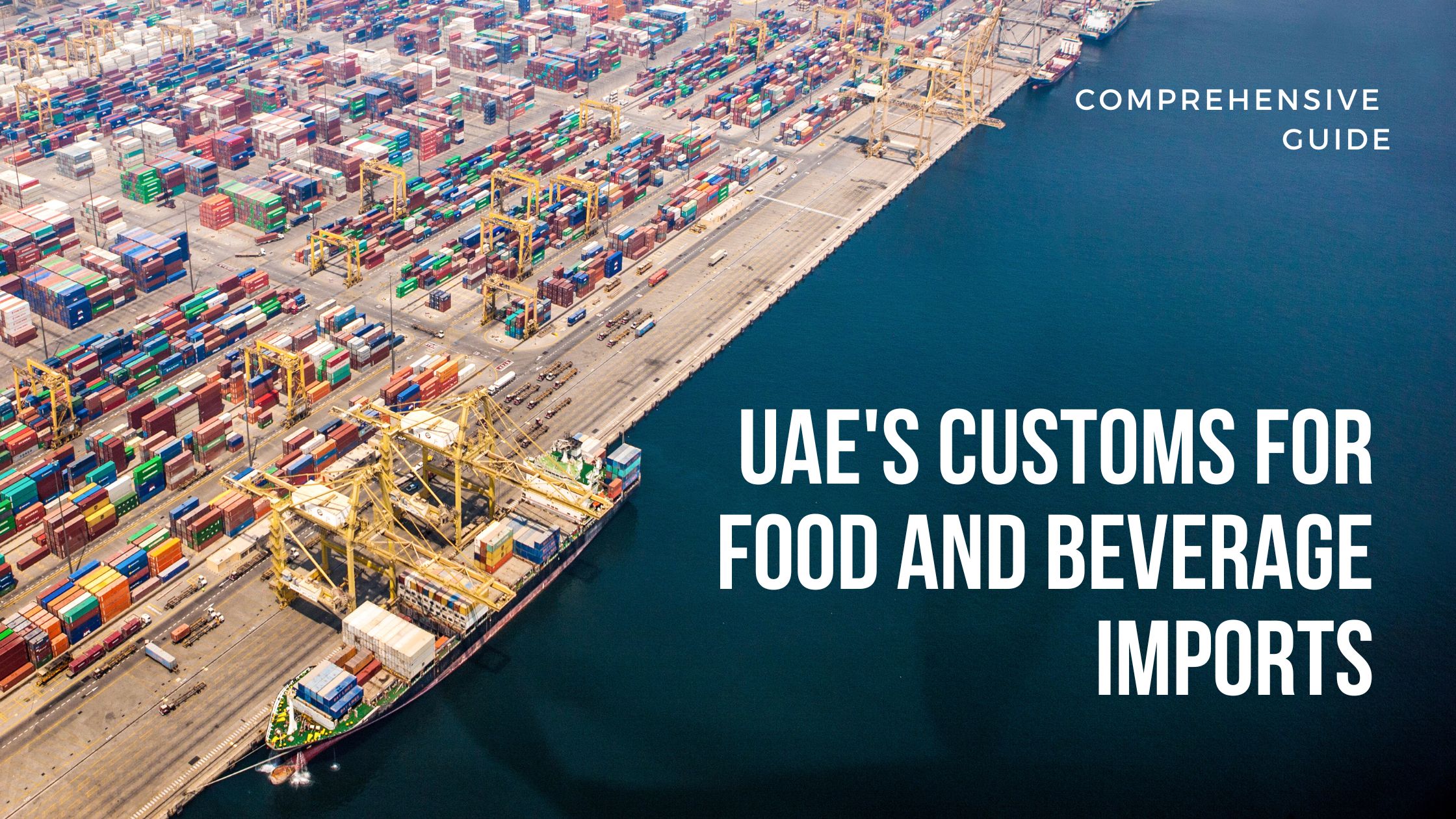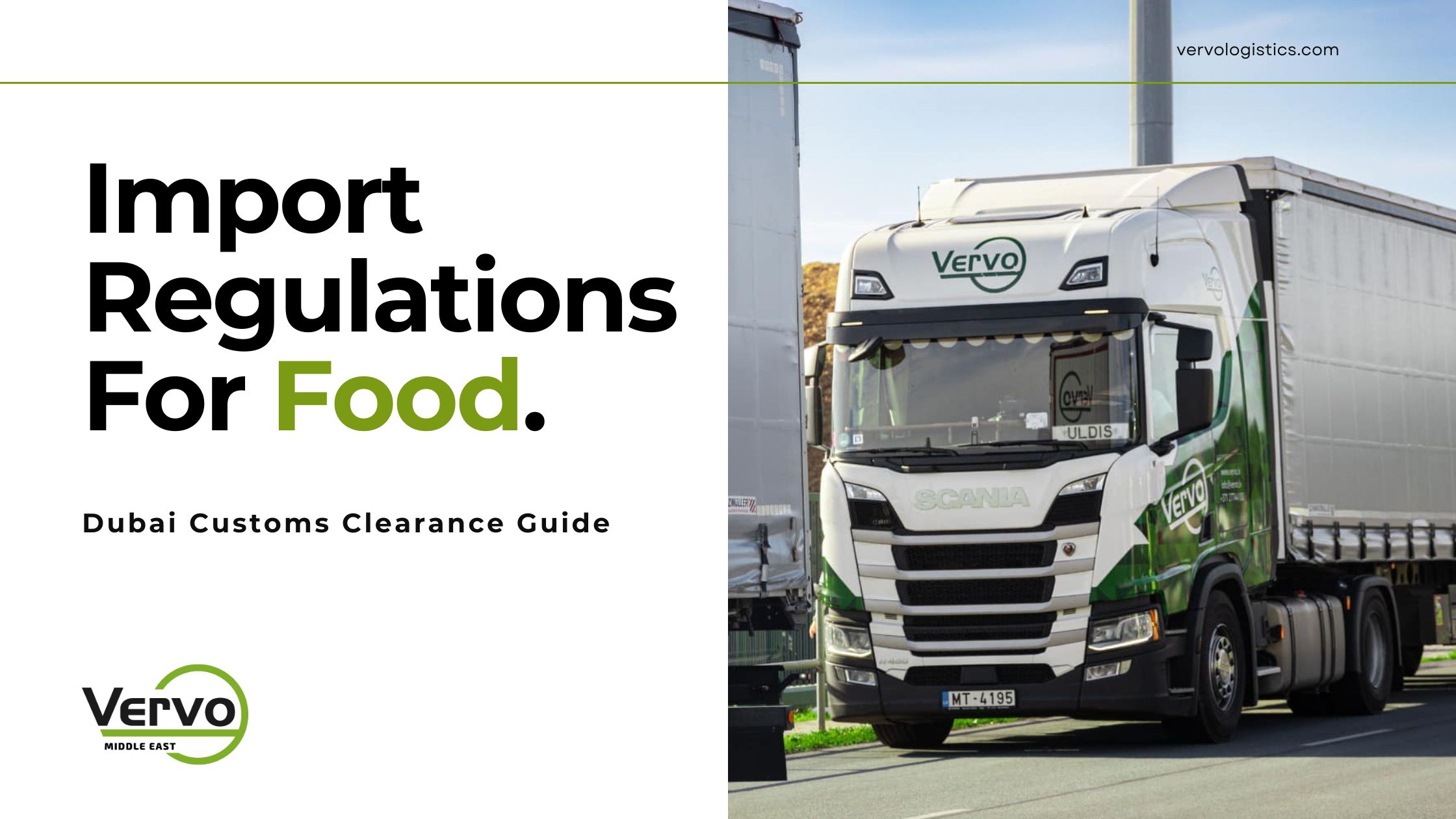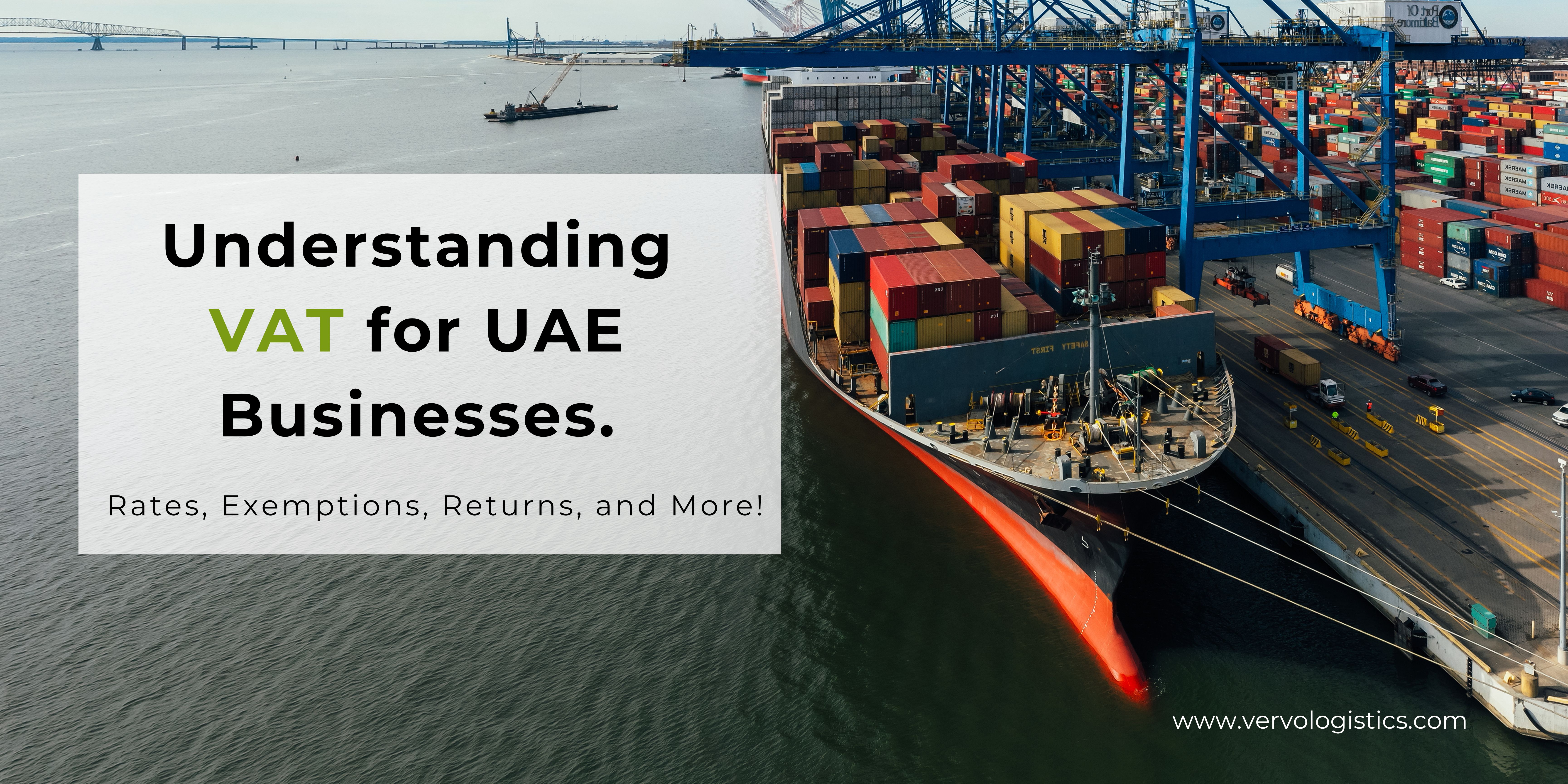It is undeniable that the United Arab Emirates (UAE) acts as a leading food import hub, given its strategic location, business-friendly environment, and growing population. Dubai, in particular, serves as a vital gateway for food trading in the Middle East region.
This article serves as a comprehensive guide for businesses looking to explore this vibrant market. We'll examine the procedures, documentation, and compliance requirements that are integral to successfully importing consumable goods into the UAE. Additionally, find strategic insights into best practices for compliance.
Vervo Middle East's logistics team helped us outline the essentials of the UAE's customs regulations for food and beverage imports, including:
✅Regulatory Framework
✅Cultural Considerations (Influencing Market Demand)
✅Tariffs and Taxes
✅Prohibited and Restricted Items
✅Compliance Best Practices
✅Food Safety and Labeling Standards
We aim to offer a holistic understanding of the complexities of UAE customs and see how Vervo Middle East, through an end-to-end customs clearance service in the UAE, ensures the seamless entry of food and beverage cargo into the UAE.
I. Food and Beverage Market and Import Regulations
Food import volumes have risen steadily in recent years. In 2021 alone, Dubai imported 9.9 million tonnes of food products valued at AED 57 billion. Industry sources estimate the country's food consumption is growing at a pace of 11% annually. Top food imports include meat, seafood, dairy, grains, fruits, vegetables, and packaged or processed items.
As a member of the Gulf Cooperation Council (GCC), the UAE adheres to certain food safety regulations and standards set at the regional level by organizations like the GCC Standardization Organization (GSO). However, the country also institutes its own additional national food laws and import requirements.
To facilitate the massive flow of imported food and provide oversight, the UAE government has instituted a comprehensive regulatory system. At the federal level, the Ministry of Climate Change and Environment (MOCCAE) establishes standards and regulations for food safety and biosecurity. Local municipalities in each emirate are tasked with implementing these federal rules, vetting all imports, and releasing compliant shipments.
Key focus areas for the regulatory bodies include proper documentation, registration and labeling, import restrictions, laboratory testing and sampling, cold chain management, and adherence to shelf-life requirements. Additionally, regular inspections are conducted using a risk-based approach to identify potential public health hazards.
With a world-class infrastructure for air and sea transportation, state-of-the-art logistics capabilities, and favorable policies, the UAE will continue to strengthen its position as the preeminent hub for food imports in the Middle East. The country's regulatory framework will also evolve to ensure safety, quality, and sustainability as import volumes grow.
II. Regulations and Procedures
The GSO (Gulf Standardization Organization) is responsible for developing many of the food safety and quality standards that are adopted across GCC member states, including the UAE. These GSO standards serve as a baseline reference, though individual countries may impose additional national regulations.
However, the UAE maintains a rigorous regulatory system to ensure the safety and compliance of imported foods. Several government entities play important roles in the oversight process:
- The Ministry of Climate Change and Environment (MOCCAE) has established national standards, regulations, and safety laws related to food safety at the federal level. They oversee issues related to sanitary and phytosanitary measures, veterinary health, food contaminants, additives, labeling, etc. MOCCAE also manages import regulations for high-risk products like meat, seafood, and dairy.
- The Emirates Authority for Standardization and Metrology (ESMA) has also formulated detailed food standards and conformity requirements for food quality. They have technical regulations covering food packaging, expiration dates, nutritional labeling, genetically modified organisms, organic claims, and more. ESMA also oversees halal certification standards.
- Individual emirate municipalities (e.g., Dubai, Abu Dhabi, Sharjah, etc.) serve as the main regulatory bodies that directly oversee food imports at ports of entry. They register new products, review paperwork, conduct physical inspections, collect samples for lab testing, and make final decisions on product release or detention.
There are a number of key requirements that food importers must fulfill:
Registration - Importers must register all new food products online prior to first shipment. This involves label reviews and potential laboratory testing before first import.
Documents - Commercial invoices, certificates of origin, bill of lading, packing lists, origin certificates, health certificates issued by competent government authorities, and import permits must accompany all shipments.
Barcodes - Unique barcodes linked to each product in the UAE's national food registry database. These unique barcodes are required to identify and trace all imported food items in the UAE's registration system.
Labels - Bilingual labels with mandatory information in Arabic and English, such as product name, ingredients, manufacturer, country of origin, dates, etc. Stickers can be used for translation.
Shelf Life - Strict validation and formatting of production and expiration dates must be clearly and directly printed on all food packaging in an approved format.
Restricted - Adherence to numerous import restrictions, including imports of alcohol, pork, and other strictly regulated substances, is tightly controlled under UAE law. Some products, like meat and seafood, have defined country-wide access.
Once shipments arrive, authorities will conduct document verification, physical inspections, and random sampling to test for compliance. Products lacking the proper documentation or labeling may be rejected or placed under detention.
Regular communication with Vervo Middle East’s team is essential to understanding the latest regulatory updates and labeling nuances for the UAE market. Adhering to the established protocols will help avoid costly delays or penalties during the import clearance process.
III. Inspection and Testing
In line with GCC-wide regulations, the UAE employs a risk-based approach to determine the level of inspection and testing required for imported food shipments. A rigorous evaluation model is used to classify each product into high-, medium-, or low-risk categories based on potential human health hazards. Factors considered include product type, ingredients, processing methods, packaging, and more.
The risk-based inspection and testing requirements are:
| Risk Category |
Examples |
Inspection Rate |
Sampling Rate for Lab Analysis and Quality Checks |
|---|---|---|---|
|
High |
Meat, dairy, seafood, and infant formula |
Extensive documentary checks and intensive physical inspection |
Up to 100% |
|
Medium |
Oils, spices, grains, chips, and sauces |
15–25% physical inspection |
15–25% |
|
Low |
Carbonated drinks, sugar, packaged fruits and vegetables |
5-10% inspection |
5–10% random sampling |
During physical inspection at ports, authorities check that packaging, labeling, and other characteristics match what is declared in the paperwork. Verification of production and expiration dates is a key focus.
Samples collected are rigorously tested at accredited laboratories as per UAE standards. Pathogen testing, nutritional analysis, shelf-life validation, and screening for allergens, additives, and pork derivatives are undertaken as applicable.
Should issues arise during either document or physical checks, authorities can place shipments under detention pending further action. Based on risk, some items may be suitable for conditional release with restrictions on sale or distribution. Serious or repeated non-compliance can result in penalties, fines, and even import bans.
IV. Fees, Duties, and Taxes
In addition to meeting all regulatory requirements, food importers to the UAE must factor in various fees, duties, taxes, and quotas imposed at both federal and individual emirate levels into their total landed costs.
The GCC has established a Unified Customs Law and tariff system. While most food items entering the UAE are exempt from duties, certain products are subject to GCC-wide tariffs such as a 5% duty on processed foods.
Charges may apply to registration, inspection, customs clearance, documents, laboratory testing, and more. Rates can also vary based on factors like cargo category, quantity, country of origin, ingredients, and end use. As such, developing a sound understanding of the applicable fees, duties, and taxes is critical for exporters seeking to enter or expand in the lucrative UAE market. This can be easily planned for with Vervo Middle East.
Here is a quick overview of the most common taxes and duties required:
|
Registration Fees |
Importers must pay fees to register new products and submit labels for review. Additional charges apply for laboratory testing and obtaining health certificates. |
|
Inspection Fees |
Local municipalities levy charges for physical inspection of shipments, sampling, and clearance procedures at ports. |
|
Customs Duties |
Most raw and semi-processed agricultural goods attract a 5% customs duty. Some processed foods may have higher duties. |
|
Excise Taxes |
The UAE applies a 100% excise tax on energy drinks and a 50% tax on carbonated beverages. This is to discourage overconsumption. |
|
Value-Added Tax |
A standard 5% VAT applies to the vast majority of food items entering the UAE. Certain exemptions exist. |
|
Alcohol Tax |
Imported alcohol is subject to a 30% tax in addition to the regular 5% customs duty. Pork products also have a 100% duty. |
|
Municipal Taxes |
Dubai and other emirates charge a municipality tax on hotel services and restaurant bills. This may impact wholesale food service distributors. |
|
Tariff Rate Quotas |
The GCC has tariff rate quotas on some food commodities, like poultry and dairy products. Once a quota is exceeded, a 25% customs duty applies. |
New entrants to the UAE food import market face fiscal obligations with a multilayered system of fees, duties, taxes, and quotas administered through various ministries, municipalities, and customs authorities.
While the costs can accumulate, balancing legal compliance with financial prudence is essential to remaining competitive.
That is why partnering with a qualified local partner, like Vervo Middle East, is advisable to ensure smooth customs clearance and avoid any unnecessary penalties. Check out our comprehensive customs clearance services in the UAE and request your free personalized quote today.
Reach us out at: 🌐Vervologistics.com | ☎ +971508723352 | 📧




